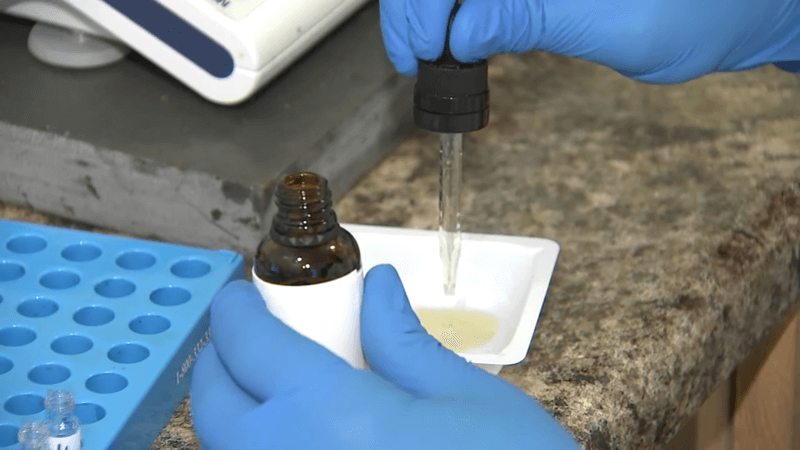No products in the cart.
When it comes to our cherished furry companions, most people will question if CBD for dogs with heart murmur is good or bad. Much like humans, dogs can face various health challenges, some of which manifest as unexpected sounds or symptoms, such as heart murmurs. In this blog, we will delve into the world of CBD for dogs with heart murmurs, exploring what heart murmurs are, their potential causes, observable signs, and how to effectively address them.
Heart Murmur in Dogs: What You Need to Know
A heart murmur in dogs is an abnormal sound that can be heard during a veterinary examination of the heart. It is typically described as a whooshing or swishing noise caused by turbulent blood flow within the heart or blood vessels. While not a disease itself, it serves as a vital indicator of potential underlying heart or vascular issues in dogs, often graded on a scale of severity. Regular veterinary check-ups are essential for early detection and monitoring, as the specific cause and severity of the murmur determine the appropriate treatment and care plan for the dog’s cardiac health.

Signs of Heart Murmur in Dogs
- Coughing: persistent cough, especially noticeable during activities like playtime or when your dog’s resting at night.
- Breathing Trouble: With a heart murmur, they might seem out of breath even after light activity, and their breathing might be faster or more labored than usual.
- Fatigue and Weakness: It’s like your dog suddenly feeling like they’ve run a marathon when they’ve only gone for a short walk. They might seem tired all the time and have less energy for play.
- Decreased Exercise Tolerance: Picture your dog getting tired much quicker than before during activities they used to enjoy. It’s a noticeable change in their stamina.
- Fainting or Collapsing: In severe cases, it’s like your dog suddenly running out of steam and collapsing. This is a critical sign that needs immediate attention.
Causes of Heart Murmurs
Heart murmurs in dogs can have various underlying causes, including:
- Valvular Disease: It’s like having a leaky faucet. The heart valves, which act as gates to keep blood flowing in the right direction, might not close properly. This causes some blood to slip backward, creating that whooshing sound, or murmur.
- Congenital Heart Defects: Think of this as being born with a house that has a few architectural quirks. Some dogs have structural issues in their hearts right from the start, and these can lead to murmurs right from puppyhood.
- Dilated Cardiomyopathy: This is like stretching a rubber band until it’s too loose. The heart chambers get bigger, and the heart muscle weakens, which can cause murmurs as it struggles to pump blood effectively.
- Heartworm Disease: Picture this as a traffic jam on the heart’s highways. Infections with heartworms can block the blood vessels in the heart, disrupting the smooth flow of blood and creating murmurs.
- High Blood Pressure (Hypertension): Imagine your dog’s heart as a muscle trying to lift a heavy weight. When blood pressure climbs too high, it puts extra strain on the heart, leading to murmurs over time.
- Other Medical Conditions: Sometimes, it’s like a ripple effect. Certain health problems or diseases elsewhere in the body can indirectly affect the heart, causing it to murmur as a secondary issue.
How to Treat Heart Murmur in Dogs
The treatment for a heart murmur in dogs depends on its underlying cause and severity. In many cases, the treatment focuses on managing the condition causing the murmur rather than the murmur itself. Treatment options may include:
- Medications to manage heart disease, such as diuretics, ACE inhibitors, or beta-blockers.
- Dietary changes to reduce sodium intake and support heart health.
- Weight management and exercise restrictions.
- Managing underlying conditions like high blood pressure or heartworm disease.
- Surgical intervention for severe cases, such as repairing heart defects or replacing damaged heart valves.

Importance of Addressing Heart Murmur in Canines
Addressing a heart murmur in dogs is crucial for several reasons:
- Better Quality of Life: Addressing a heart murmur early is like fixing that engine noise promptly. It means your furry companion gets the right treatment to keep their heart working smoothly. This translates to a happier, more comfortable life for your pup, with less coughing, fatigue, and discomfort.
- Slowing Down the Progression: Just like fixing your car engine prevents further damage, addressing heart murmurs in dogs can slow down the progression of heart disease. It’s like stopping a small problem from becoming a big one.
- Effective Management: Some heart conditions can be managed effectively with medication and lifestyle changes. But here’s the catch: the sooner you start, the more effective these treatments can be. Delaying can make them less helpful.
- Early Detection: This is like catching a small dent on your car’s bumper before it turns into a big, expensive repair. Regular vet check-ups, including listening to the heart for murmurs, are crucial for spotting heart issues before they become complicated and tough to handle.
- Avoiding Critical Breakdown: Ignoring heart murmurs is like ignoring that strange engine noise until your car breaks down on the highway. In the case of dogs, it could lead to something as serious as congestive heart failure, a life-threatening condition.
The Difference Between Heart Murmur in Dogs and Other Diseases
Heart murmurs in dogs are distinct from other diseases because they are not a specific disease themselves; rather, they are a clinical sign of an underlying issue with the heart or blood vessels. The key differences include:
- Heart murmurs are sounds heard during a veterinary examination, while diseases are specific health conditions that can affect various organs or systems.
- Heart murmurs indicate abnormal blood flow or heart function, while diseases can encompass a wide range of issues, from infections to metabolic disorders.
- Heart murmurs can result from various underlying causes, such as valvular disease, congenital defects, or heartworms, while diseases may have distinct causes and symptoms.
- Diagnosing the specific cause of a heart murmur typically involves additional tests, such as echocardiograms and X-rays, to evaluate the heart’s structure and function, whereas diagnosing a disease may require different diagnostic procedures.
- The treatment and management of heart murmurs depend on the underlying cause and severity, making it essential to determine the root issue for effective care.
Consequences of Untreated Heart Murmurs
Untreated heart murmurs in dogs can lead to several serious consequences:
- Progression of Heart Disease: Heart murmurs are often associated with underlying heart conditions. Without treatment, these conditions can progress, causing more severe symptoms and complications.
- Congestive Heart Failure: Advanced heart disease resulting from untreated heart murmurs can lead to congestive heart failure, a life-threatening condition in which the heart’s ability to pump blood is severely impaired.
- Reduced Quality of Life: Dogs with untreated heart murmurs may experience discomfort, fatigue, coughing, and difficulty breathing, reducing their overall quality of life.
- Shortened Lifespan: The lack of treatment for heart murmurs can significantly shorten a dog’s lifespan, as untreated heart disease can lead to premature death.
- Limited Treatment Options: Delayed intervention may limit the effectiveness of treatment options. Timely diagnosis and management offer the best chance for successful treatment and symptom control.
CBD for Dogs with Heart Murmur: Can It Help?
The potential use of CBD for dogs with heart murmurs is a topic of interest, but its effectiveness is not yet well established. While some pet owners and veterinarians have reported anecdotal benefits, CBD should not be considered a primary or sole treatment for heart murmurs or underlying heart conditions. It’s crucial to consult with a veterinarian to develop a comprehensive treatment plan tailored to your dog’s specific needs. CBD may be considered a complementary therapy, but its use should be supervised and discussed with a healthcare professional.

The Potential Benefits of CBD for Dogs with Heart Murmur
CBD, derived from hemp or cannabis plants, has gained attention for its potential benefits for dogs in various health conditions. Although more research is needed, some potential benefits of CBD for dogs with heart murmurs or heart conditions may include:
- Anti-inflammatory Buddy: It’s known for its anti-inflammatory superpowers, which can be a game-changer for dogs with heart issues. It helps reduce the swelling and irritation that can come with heart conditions, making life a bit more comfortable.
- Pain Whisperer: CBD is like your dog’s secret ally against pain. It can help ease discomfort, which is especially important for pups dealing with heart-related aches and pains. Just think of it as your dog’s way of saying “thanks” for the relief.
- Stress Buster: CBD can be like a calming hug for your dog’s nerves. It helps reduce stress and anxiety, which is a big deal for dogs with heart issues since stress can make their symptoms worse.
- Quality of Life Booster: Some pet owners swear by CBD for making their dogs feel more like themselves. It’s like giving your furry buddy an extra spring in their step, making playtime more enjoyable and enhancing their overall well-being.
Mistakes When Using CBD
When using CBD for dogs, avoid common mistakes such as:
- Not Consulting a Veterinarian: Consult with a veterinarian before starting any CBD regimen for your dog, especially if your dog has underlying health conditions.
- Inaccurate Dosage: Giving the wrong dosage can lead to ineffective results or potential side effects. Ensure you administer the correct dosage as advised by a veterinarian.
- Using Low-Quality Products: Not all CBD products are of the same quality. Choose reputable brands that provide lab-tested, high-quality CBD products specifically formulated for pets.
- Neglecting Other Treatments: CBD should not replace traditional veterinary care. It may complement other treatments but should not be used as a substitute.
- Ignoring Side Effects: Monitor your dog for any adverse reactions, such as lethargy or digestive issues, and discontinue use if negative side effects occur.
- Not Giving It Time: CBD may take time to show noticeable effects in some dogs. Be patient and consistent with the regimen.
Different Forms of CBD Products for Dogs
CBD for dogs is available in various forms, including:
- CBD Oil or Tinctures: They’re liquid extracts that you can either put directly in your dog’s mouth or mix with their food. The great thing about them is that they give you precise control over the dosage, making it easier to tailor the amount to your dog’s specific needs.
- CBD Capsules or Softgels: They come in pre-measured doses, just like regular pills. You can give them to your pup like any other medication or, if your dog’s a bit picky, open them up and mix the contents with their food. They’re super convenient.
- CBD Treats: CBD-infused treats or biscuits are a hit with many dogs. It’s an easy and enjoyable way to give your furry friend their CBD. Plus, they often don’t even realize they’re getting a health boost in their snack.
- CBD Topicals: These are like the creams and balms you’d use for your own skin or joint pain. They’re infused with CBD and designed for localized relief. If your dog has joint discomfort or skin issues, you can apply these directly to the problem area for some extra comfort.
- CBD Isolate: Picture this as the purest form of CBD. It comes in a crystalline form, and you can mix it with your dog’s food or even apply it directly to their skin if needed. It’s like the “no-frills” option, ideal if you want to keep things simple.
Conclusion
While CBD for dogs with heart murmur holds promise as a potential complementary therapy, Heart murmurs are important indicators of underlying issues, much like warning lights on our car’s dashboard. Regular veterinary check-ups, early detection, and appropriate treatment remain the cornerstones of ensuring our dogs enjoy the best quality of life.
I am Nelson Cooper, I pursue my passion for writing and my belief is that cats love humans. I enjoy traveling and have a deep appreciation for the beauty of nature, as well as a soft spot for animals, particularly cats.



